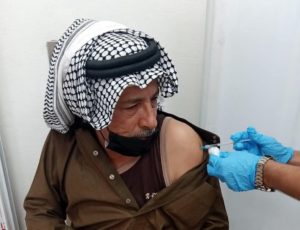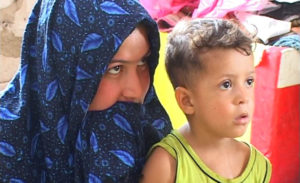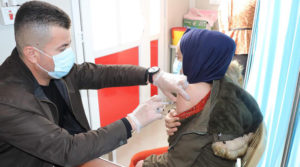“I swear, I can’t afford to buy masks and gloves to protect ourselves against the coronavirus. Since the outbreak of the Coronavirus, our living condition has worsened even more,” Salaby Bakrad Arsin spoke of the hardships she and her family has been through.
The imposing of lockdown and preventive measures to prevent the spread of the Coronavirus, has brought Salbi’s husband’s daily business to a halt, all he gets now is a monthly salary of 250 thousand Iraqi dinars, insufficient to meet the needs of his five-member family.
Salby Bakrad Arsin, 37, a member of the Armenian minority and mother of three, feels terribly consumed by the devastating consequences of the pandemic. “Our life is very difficult, our living conditions are deteriorating, and the impacts of the pandemic have added to our suffering as my husband still not able to go to work and earn money.”
Arteen Magdichm, is an Armenian IDP in Horisk village, says they need food and medical supplies due to COVID-19
This Armenian family is originally from Ninewa province; they fled their home more than five years, after the arrival of the Islamic State (IS) group and settled in Horisk, a village in Dohuk province.
“Since the start of Coronavirus pandemic, we have not gone out of the house. I do not allow my kids to mix up with other people. This is the only option we’ve got,” says Salby.
I do not allow my kids to mix up with other people. This is the only option we’ve got
In Iraq, the number of people infected with Coronavirus is on the rise, and partial lockdowns imposed in most areas are forcing many to stay in their households, leaving major impacts on their lives.
Arteen Magdichm another Armenian who had to flee his hometown in Ninawa after spending 40 years there, has been enduring life in displacement for six years now in Dohuk.
Muklad Wartianyan, the commissioner of Horisk village, explains ther efforts to contain the spread of COVID-19
Speaking to KirkukNow Arteen said, “Despite the tough living conditions we are currently going through due to the consequences of Coronavirus, no organization has offered to help us, while most people here live in poverty and are unable buy prevention supplies. “
Arteen along with most of the residents of the village in Horisk lost their businesses, mostly include agriculture, “Coronavirus has affected us all, ” says Arteen whoo called upon the government and humanitarian organizations to provide them with needed assistance.
Coronavirus has affected us all
Horisk village is 8 kilometers from Simel district in Dohuk. The village where 350 families live was built in 2006, most of them are Armenians, some of whom fled their homes in Ninewa province to escape (IS)’s brutality.
Muklad Wartianyan, the headman of Horisk village, speaking to KirkukNow said, “We will do everything we can to protect ourselves from the Coronavirus pandemic, we have spared no effort in this concern and the rest is up to the relevant authorities to help us secure disease prevention and health supplies and also spray sanitizers in the village.”
We will do everything we can to protect ourselves from the Coronavirus pandemic
The villagers are committed to their own strict procedures; they do not allow anyone to enter the village unless they are quite sure he or she isn’t infected with the virus.
“We shut down the church and the occassions’ hall. We stress on social distancing, because if anyone gets infected with the virus it might spread to everyone in the village.”
The total population of the Armenian minority in Iraq is currently estimated at 20,000, most of them live in Baghdad, Mosul, Kirkuk and the Kurdistan Region.
“We were lucky that the Coronavirus did not reach our village, the disease prevention tools and the medical supplies here are scarce, therefore you see people are strictly committed to the precautionary measures.
Shant is a taxi driver, who hasn’t been able to work for two months because of the ongoing partial lockdown. “we live under appalling living conditions, we lost our jobs, at the same time our daily needs which we must provide on our own have increased.”
Like other minorities in Ninewa, the Armenian minority faced persecution by IS in the period between mid-2014 and the end of 2017. Many families still in displacement, with the Armenians, along with the Kakayi, Shabak and Turkmens, representing 10% of the total 787 thousand displaced people in the Kurdistan Region.
Shant and other members of the Armenian community currently settled in Horisk village are urging humanitarian organizations for help to alleviate the burdens of displacement that have become more severe due to the consequences of the Coronavirus pandemic.



